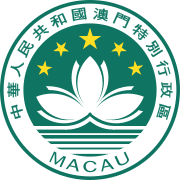| Case 3/2008 in Macau | |
|---|---|
 | |
| Court | Court of Final Appeal (Macau) |
| Decided | February 12, 2008 |
| Citation(s) | Processo n.º 3/2008 |
| Transcript(s) | Judgment in Portuguese Chinese translation |
| Case history | |
| Related action(s) | Case 12/2007 in Macau[1] |
| Court membership | |
| Judges sitting | Viriato Manuel Pinheiro de Lima, João Augusto Gonçalves Gil de Oliveira, Jorge Miguel Pinto de Seabra |
| Case opinions | |
| Extraditing fugitives is subject to the provision of special law, but there was no such law for extradition to Mainland China. | |
| Decision by | Viriato Manuel Pinheiro de Lima |
| Concurrence | João Augusto Gonçalves Gil de Oliveira, Jorge Miguel Pinto de Seabra |
| Keywords | |
| |
Case 3/2008 in Macau was a habeas corpus case heard before the Macau Tribunal of Ultimate Instance. The applicant A[note 1] filed a request of habeas corpus to the court, as he believed his elder sister B was in unlawful detention by the Judiciary Police in Macau, when in fact B had been transferred to the Public Security Bureau of Zhuhai, China, one day before the request. The court has no jurisdiction outside Macau, so it ruled that there was no further need to adjudicate, on grounds of supervening impossibility of the remedy sought. The judgment, however, went on to cite a previous decision by the same court in 2007, which allowed a similar application.[1] The court this time reiterated that before specific legislation is introduced, it is illegal to transfer fugitives to mainland China, and the acts by the authority in the present case "discredit justice, undermine the Rechtsstaat and do not bring prestige to the Macau Special Administrative Region."[2]: 7 The case has since been cited by jurists in academic papers concerning the lack of extradition legislation between Macau and mainland China.
After the Hong Kong Causeway Bay Books disappearances in 2015, a report in February 2016 by South China Morning Post recalled this case.[3] The day after, Secretary for Security Wong Sio Chak, who was the head of Judiciary Police in 2008, emphasised that the extradition had followed the law, and the criticism by the court was due to different interpretation of the law.[4]
- ^ a b Tribunal de Última Instância de Macau. "Processo n.º 12/2007. Habeas corpus" (in Portuguese). pp. ii + 8.
- ^ a b Tribunal de Última Instância de Macau (12 February 2008). "Processo n.º 3/2008. Habeas corpus" (PDF) (in Portuguese).
- ^ Raquel Carvalho (21 February 2016). "Macau handed Hong Kong residents to mainland authorities, despite court declaring it illegal". South China Morning Post. Archived from the original on 4 December 2021. Retrieved 4 December 2021.
Law enforcement agencies in Macau used extrajudicial means to turn over at least three people. … As the mystery of how five Hong Kong booksellers ended up "assisting investigations" on the mainland remains murky, fears are growing stronger… Jorge Neto Valente, head of the Macau Lawyers Association, said. "Regardless if there are many or few cases, the principle is wrong."
- ^ "Governo nega entrega de fugitivos por via extrajudicial". Ponto Final (in Portuguese). 23 February 2016. Archived from the original on 4 December 2021. Retrieved 4 December 2021.
Wong Sio Chak clarificou que depois de 2008 – e na sequencia das diferentes interpretações feitas pelo Ministério Público e pelo Tribunal de Última Instância – as autoridades de Macau não voltaram a entregar residentes de Hong Kong à República Popular da China.
Cite error: There are <ref group=note> tags on this page, but the references will not show without a {{reflist|group=note}} template (see the help page).
© MMXXIII Rich X Search. We shall prevail. All rights reserved. Rich X Search
